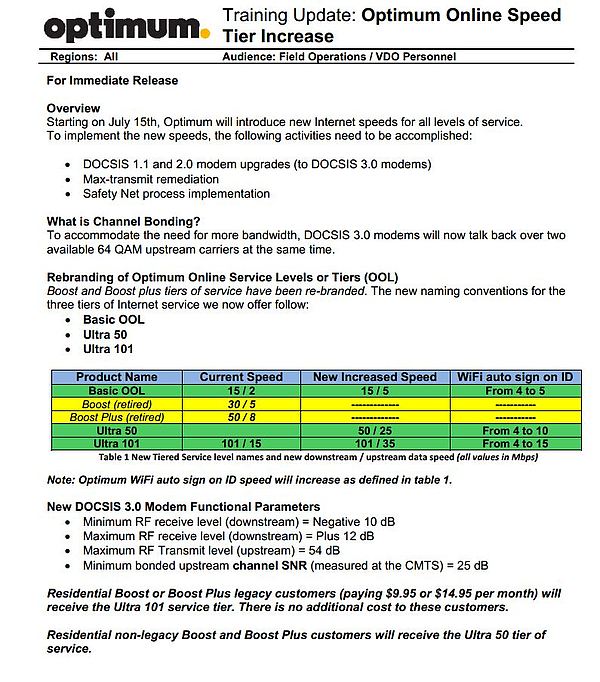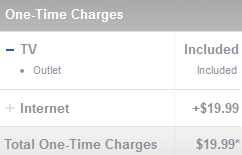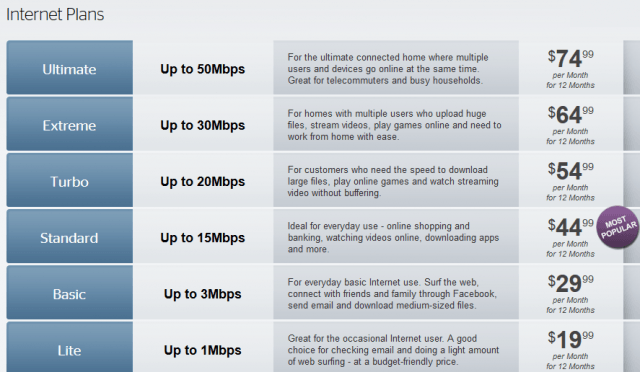 A California federal judge has rejected a class action case against Comcast for allegedly hiding modem fees as high as $15 a month when signing up new customers.
A California federal judge has rejected a class action case against Comcast for allegedly hiding modem fees as high as $15 a month when signing up new customers.
In 2010, Athanassios Diacakis made several calls to Comcast inquiring about cable service as a new customer. Diacakis claims several Comcast representatives offered a bundle of broadband, television and phone service for $99 a month. When he asked Comcast about any other charges, company representatives eventually admitted there was a $25 installation fee, but never mentioned any modem rental fees.
After Comcast installed service, Diacakis began receiving Comcast bills that included a previously undisclosed monthly modem fee of $10 and an extra “lease charge” of $5 a month associated with his broadband service.
Diacakis alleged in his complaint charging $15 a month for cable modem equipment was “outside and in excess of the specifically quoted bundled service” package he ordered.
As Below Your Means points out, renting a cable modem may be harmful to your wallet.
The plaintiff sought class certification to force Comcast to refund some or all the modem fees charged customers from 2007 to the present. His first effort failed in January 2012 on grounds of insufficient evidence. His amended complaint was rejected May 3 on similar grounds.
United States District Judge Saundra Armstrong ruled Diacakis failed on two separate occasions to produce convincing proof Comcast was actively deceiving customers with undisclosed modem fees.
 Judge Armstrong wrote that Diacakis should have come to court with evidence beyond the spoken promises of a handful of Comcast salespeople the plaintiff identified only by their first names. She was swayed by Comcast’s arguments:
Judge Armstrong wrote that Diacakis should have come to court with evidence beyond the spoken promises of a handful of Comcast salespeople the plaintiff identified only by their first names. She was swayed by Comcast’s arguments:
As Comcast correctly points out, the only evidence offered by Plaintiff regarding Comcast’s alleged practices consists of his limited personal experience in speaking with “Heather,” “Steve” and another unidentified Comcast representative in August 2010. There is no evidence that Comcast has employed any policy, custom or practice of intentionally failing to inform potential Triple Play subscribers that they will be subject to separate modem fees. To the contrary, the record presented thus far shows that Comcast trains and instructs its employees to inform customers and potential customers about all applicable charges, including those for leased equipment.
[…] As noted, he has made no showing that the representations or omissions during those calls were made pursuant to a standardized script or marketing practice. Indeed, there is no evidence that anyone other than Plaintiff was allegedly misinformed about the modem fees.
Armstrong also faulted Diacakis for not independently locating, scrutinizing, and verifying Comcast’s print or television advertising before he filed a lawsuit seeking to represent every customer paying them:
Comcast argues that Plaintiff is not an adequate representative because there is no evidence that he or anyone else was misled by its marketing and advertisements for the Triple Play package. Plaintiff does not dispute that he lacks such evidence. In addition, Plaintiff admitted during his deposition that he did not review any advertisements before contacting Comcast in August 2010 about bundling his services. Since Plaintiff could not have been harmed by any allegedly misleading advertising, he cannot adequately represent a class member who claims to have been harmed by Comcast’s alleged marketing program.
 Cablevision speeds are far better than those offered by Time Warner Cable, which serves much of the rest of New York City, especially for uploads. Time Warner tops out at 5Mbps for upstream speeds in the northeast. Customers with older equipment will need a DOCSIS 3 modem to get the Ultra-level speeds.
Cablevision speeds are far better than those offered by Time Warner Cable, which serves much of the rest of New York City, especially for uploads. Time Warner tops out at 5Mbps for upstream speeds in the northeast. Customers with older equipment will need a DOCSIS 3 modem to get the Ultra-level speeds.

 Subscribe
Subscribe

 Stop the Cap! strongly encourages Time Warner Cable customers to buy their own cable modems and avoid the rental fees. Customers can also bypass the rental fee by
Stop the Cap! strongly encourages Time Warner Cable customers to buy their own cable modems and avoid the rental fees. Customers can also bypass the rental fee by  A California federal judge has rejected a class action case against Comcast for allegedly hiding modem fees as high as $15 a month when signing up new customers.
A California federal judge has rejected a class action case against Comcast for allegedly hiding modem fees as high as $15 a month when signing up new customers. Judge Armstrong wrote that Diacakis should have come to court with evidence beyond the spoken promises of a handful of Comcast salespeople the plaintiff identified only by their first names. She was swayed by Comcast’s arguments:
Judge Armstrong wrote that Diacakis should have come to court with evidence beyond the spoken promises of a handful of Comcast salespeople the plaintiff identified only by their first names. She was swayed by Comcast’s arguments:
 The cable provider’s Turbo High Speed Internet increased earlier this year from 20 to 30Mbps for downloads. Its Lightning tier went up even more — from 40 to 60Mbps. Even Business Class customers saw speed increases to 70Mbps. But now prices are up as well — as much as $5 a month more for “upgraded broadband services,” a higher cable modem rental fee, and $3 more for television packages:
The cable provider’s Turbo High Speed Internet increased earlier this year from 20 to 30Mbps for downloads. Its Lightning tier went up even more — from 40 to 60Mbps. Even Business Class customers saw speed increases to 70Mbps. But now prices are up as well — as much as $5 a month more for “upgraded broadband services,” a higher cable modem rental fee, and $3 more for television packages: